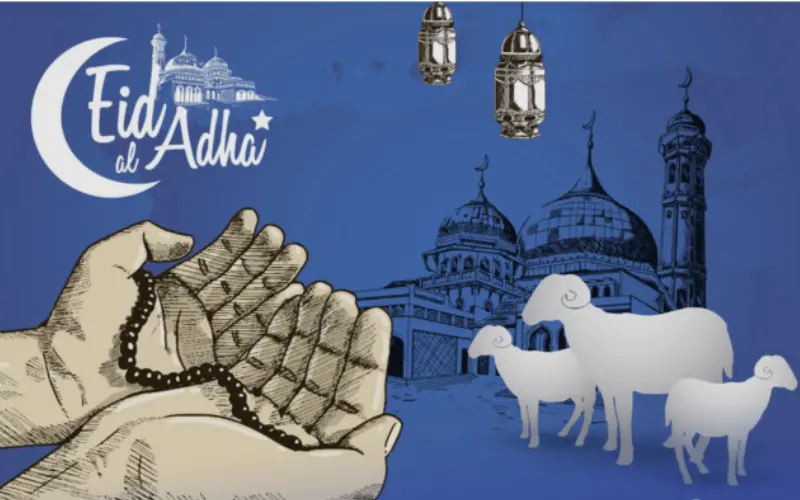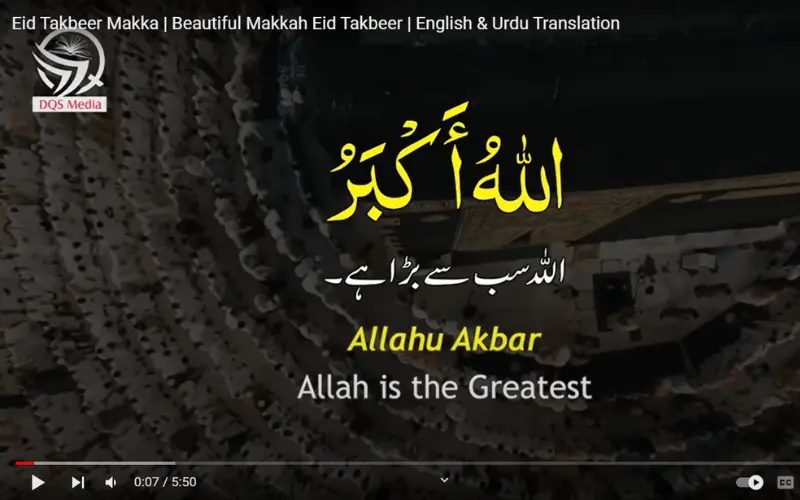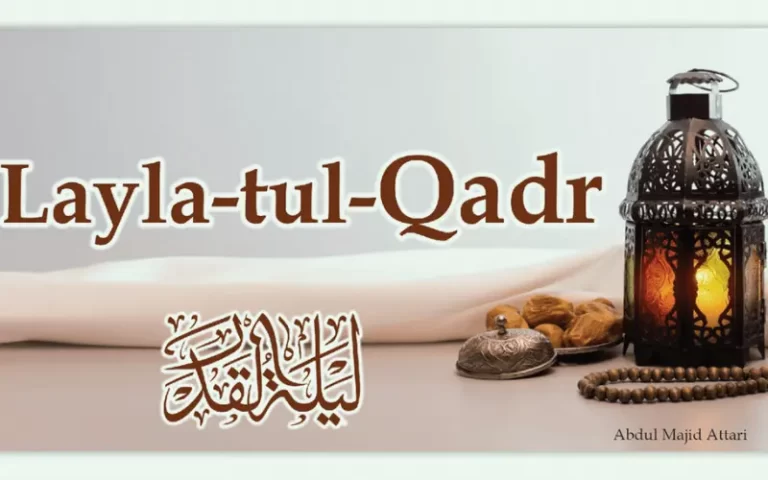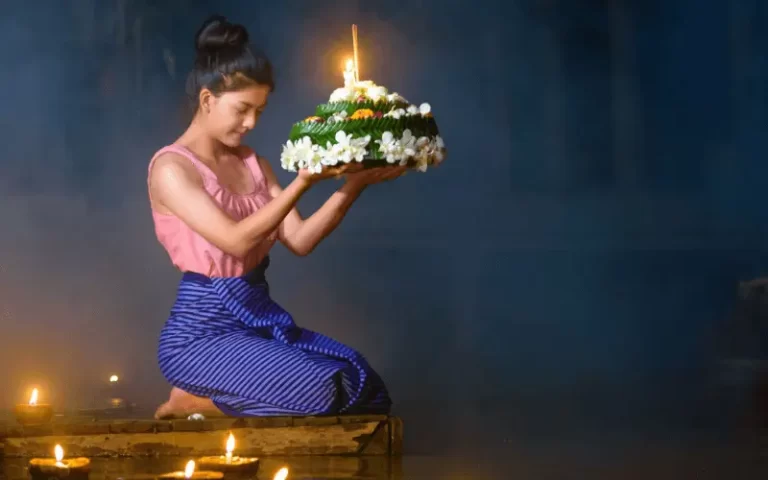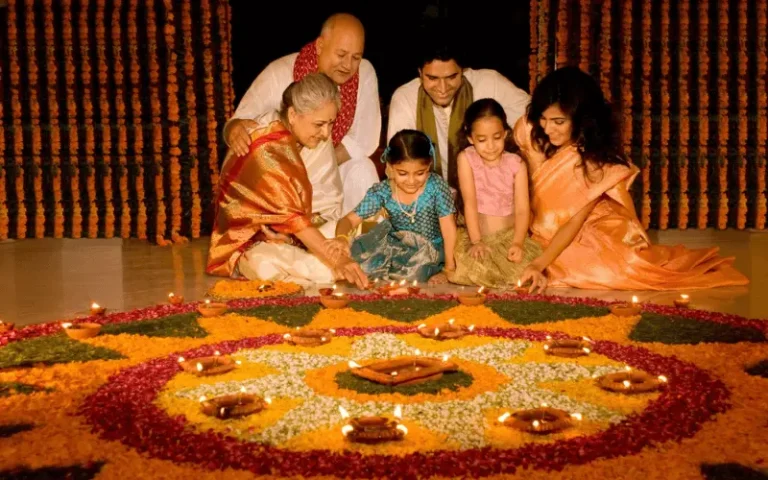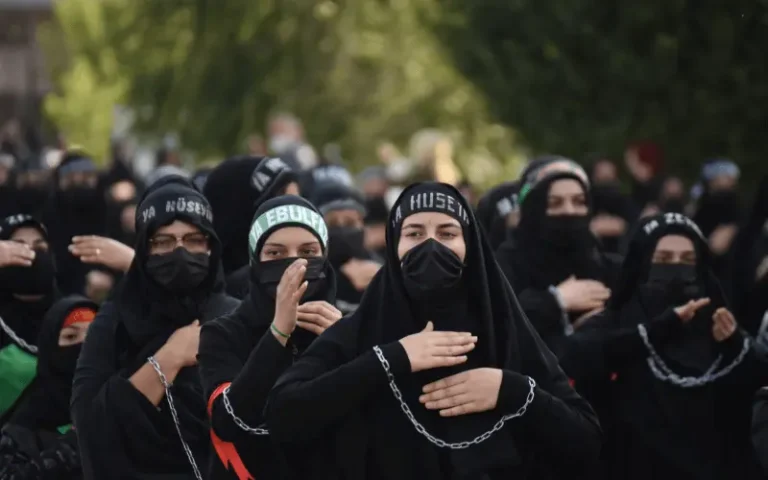Eid al Adha
Have you ever wondered why Eid al Adha is such a special time for millions of Muslims worldwide? Eid ul-Adha, also known as the Festival of Sacrifice, is a significant Islamic celebration with deep meaning and traditions. It commemorates the willingness of Prophet Ibrahim to sacrifice his son, showing his devotion and obedience to God’s command. This festival isn’t just about sacrifice, it’s a time for unity, gratitude, and sharing blessings with those around us.
Muslims celebrate Eid al Adha after performing the Hajj. Muslims celebrate two Eids every year wanna know about the other Eid? Click the link below
Eid ul Fitr| Unraveling 10 Must-Know Secrets for Eid Celebration
What is Eid al-Adha?
Eid al-Adha, also called the “Festival of Sacrifice,” is a significant Islamic celebration that honors Prophet Ibrahim’s devotion to God. It marks the willingness of Ibrahim to sacrifice his son as an act of obedience to God’s command, showcasing the essence of faith and submission. God provided a ram as a substitute for the sacrifice, symbolizing the ultimate test of Ibrahim’s dedication.
Why do Muslims celebrate Eid ul Adha?
Muslims celebrate Eid ul-Adha to honor Prophet Ibrahim’s Sacrifice, unwavering devotion, and obedience to God’s command. This significant occasion signifies sacrifice and faith, commemorating Ibrahim’s willingness to sacrifice his son as an act of submission to God’s will. Eid ul-Adha emphasizes the values of generosity, unity, and gratitude, observed through prayers, charitable acts, and the tradition of sacrificial offerings known as Qurbani Eid.
The Test of Prophet Ibrahim (AS) Story for Kids
What is the history of Eid al-Adha?
The history of Eid al-Adha dates back to the story of Prophet Ibrahim (Abraham). Ibrahim received a command in a dream from God to sacrifice his son as a test of his faith. Willing to submit to God’s will, Ibrahim prepared to fulfill this command. However, when Prophet Ibrahim (Abraham) was about to carry out the sacrifice, God intervened and provided a lamb to sacrifice instead, accepting Ibrahim’s unwavering devotion. This event symbolizes obedience, sacrifice, and the significance of submission to Allah’s will. Muslims commemorate this act of faith and submission by celebrating Eid al-Adha, also known as the Festival of Sacrifice as a reminder of Ibrahim’s devotion and God’s mercy.
What is the Duration of Eid al-Adha?
Eid al-Adha typically spans three days, starting on the 10th day of Dhu al-Hijjah, the 12th month of the Islamic lunar calendar.
Dates of Eid al-Adha in 2023 and 2024
| Year | Islamic Calendar Date | Gregorian Calendar Date | Days |
|---|---|---|---|
| 2023 | Dhu al-Hijjah 10-12 | July 29- Aug 1 | Thursday-Saturday |
| 2024 | Dhu al-Hijjah 10-12 | June 17- June19 | Monday-Wednesday |
How to Celebrate Eid al-Adha?
Muslims celebrate Eid ul Adha by doing the following things:
1. Eid Prayer on Eid al Adha
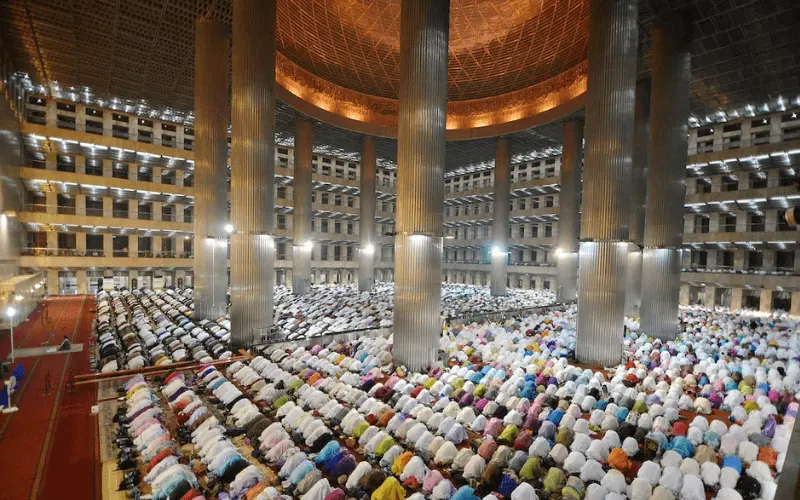
Muslims start Eid day with a special congregational prayer, known as the Eid prayer, held at mosques or open spaces.
2. Exchanging Greetings and Wishes
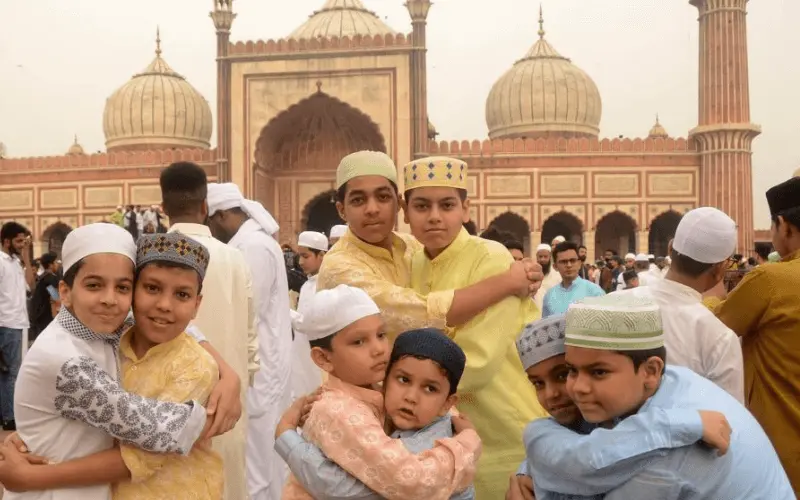
After performing the Eid prayer Muslims share warm hugs and greetings by saying Eid Mubarak to friends, family, and neighbors, spreading joy and blessings.
3. Chanting Takbeerat
Muslims recite Takbeerat, glorifying Allah, throughout Eid days as an expression of faith and celebration.
“Allahu Akbar, Allahu Akbar, La ilaha illallah, Wallahu Akbar, Allahu Akbar, Wa lillahil hamd.”
Translation: “God is the Greatest, God is the Greatest, There is no deity but God, God is the Greatest, God is the Greatest, And all praises are due to God.”
4. Ritual Slaughter (Qurbani)
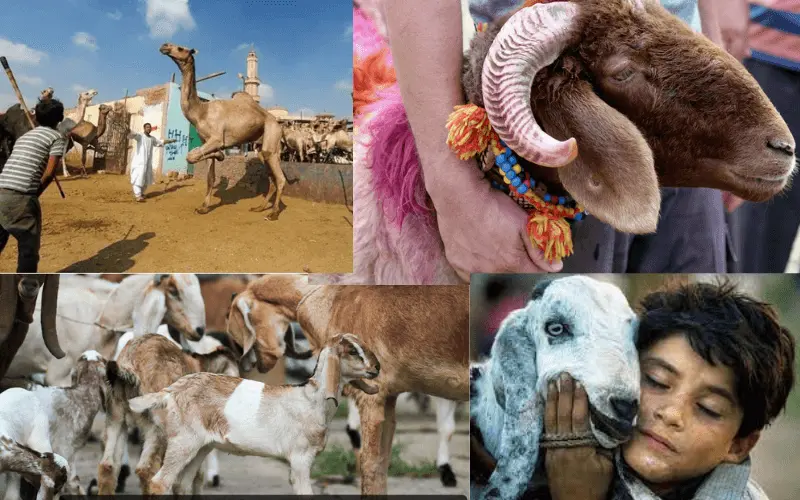
Many households perform Qurbani, sacrificing animals like sheep, goats, camels, or cows symbolizing obedience to Allah.
5. Dressing Traditionally
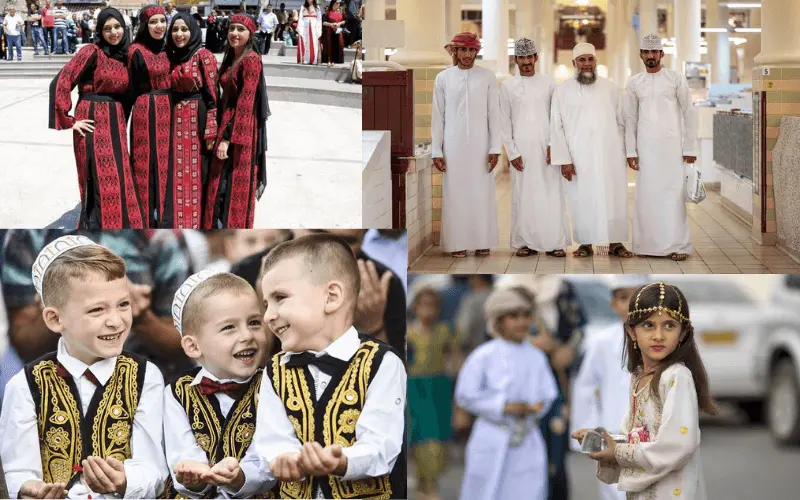
On this Holy occasion, Muslims often wear their traditional attire that reflects festivity and respect for the occasion. In Pakistan, Muslims wear shalwar and kurta, In Saudi Arabia Muslims wear thobe or thawb, etc.
6. Eid al-Adha Feasting and Sharing Meals
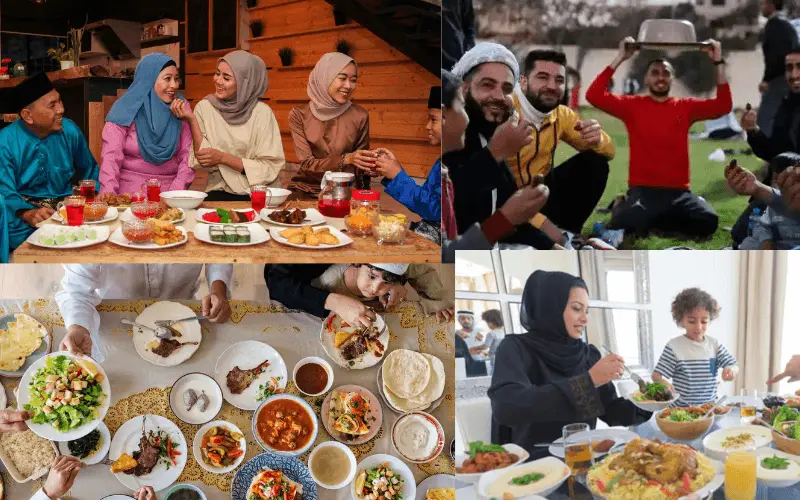
Families come together for elaborate meals, especially featuring dishes made from the sacrificed animal like biryani, mutton krai, kabab, and tikka, etc fostering unity and sharing blessings.
As Qurbani (sacrificing animal) is central to this celebration I wanna discuss Questions that are compulsory to know about animal sacrifice.
What are the Rules of Qurbani (sacrificing animals)?
The rules of Qurbani (animal sacrifice) in Islam include:
What to do If an animal gets harmed, dies, or lost after you buy it with the intention of Qurbani?
Qurbani is obligatory for whom?
Qurbani, or animal sacrifice, is obligatory for financially capable adult Muslims who meet specific wealth criteria known as Nisab during the days of Eid al-Adha.
The exact Nisab for the obligation of Qurbani is based on the value of silver, which is roughly equivalent to the cost of 612.36 grams of silver. If one’s wealth meets or exceeds this value after deducting debts and necessary expenses, they become obligated to perform the Qurbani sacrifice during Eid al-Adha.
Is Qurbani obligatory for those who meet the financial criteria (nisab), and what are the consequences for intentionally avoiding it?
In Islam, the act of sacrifice (Qurbani) is considered either “Wajib” or “Farz” for eligible individuals who possess the Nisab (wealth threshold). If someone meets the criteria for Qurbani and deliberately avoids performing it without a valid reason then Prophet Muhammad mentioned that person
Narrated by Hazrat Abu Hurairah Prophet Muhammad mentioned that an individual who is capable of performing Qurbani but intentionally avoids doing so should not even approach the Eidgah (place of Eid prayer).
What criteria determine the selection of an animal for sacrifice during Eid al-Adha?
| Animal | Age | Criteria |
|---|---|---|
| Sheep/Goat/Ram | 1 year or older | Healthy, free from defects, and fit for sacrifice. |
| Bull/Buffalo/Cow/Ox | 2 years or older | Good health, no defects, and suitable for sacrifice. |
| Camel | 5 years or older | Healthy, without major defects, and appropriate for the ritual. |
| Sheep (6-12 months) | Physically appears to be a year | Healthy and similar in appearance to a one-year-old sheep, suitable for sacrifice. |
| Cattle/Camel for sharing | Varies | Healthy, meeting sharing requirements, and intended for sacrifice. |
| Animals Unsuitable for Qurbani | Various | Animals with defects like broken horns, impaired vision, missing limbs, extreme thinness, or injuries. |
Table of Contents
What is the Method of Slaughtering an Animal?
The proper method of slaughtering an animal for Qurbani during Eid al-Adha involves several considerations to ensure a humane and respectful sacrifice.
What are the rulings on meat distribution?
The rulings on meat distribution after performing Qurbani during Eid al-Adha involve the following aspects:
1. Apportioning the Meat
While it’s recommended to divide the meat into three parts—part for the family, part for friends and relatives, and part for the poor—it’s not mandatory. Keeping all the meat for oneself is permissible.
2. Distribution Method
If the animal has multiple shares, the meat should be distributed by weighing it, except if the head, feet, or skin are included in the shares. Estimation is not recommended.
3. Sale Prohibition
Selling Qurbani meat is not allowed. It’s also not permissible to use the meat as payment for those who perform the slaughtering or skinning; they should be paid separately.
4. Voluntary Qurbani Meat
The meat from voluntary (nafl) Qurbani made on behalf of a deceased person may be consumed by anyone.
5. Consumption and Serving
Qurbani meat can be consumed personally or served to others, such as at a Walima (marriage feast).
6. Use of Skin
Using the skin for personal purposes, like as a prayer mat (Musalla) or a leather pouch, is permissible. However, if the skin is sold, its income must be given to charity, as it’s not allowed to use the income for oneself.
What interpretations exist about Prophet Ibrahim’s sacrifice of his son in Islam, Christianity, and Judaism?
Prophet Ibrahim (Abraham in Christianity) is revered in Islam, Christianity, and Judaism as a significant figure. In Islam, he’s known for his unwavering faith and submission to God’s will. One of the most pivotal events associated with him is the story of his willingness to sacrifice his son, Isma’il (Ishmael), as a testament to his obedience to God. According to Islamic tradition, this act symbolizes absolute devotion to God’s commands.
Similarly, in the Old Testament of the Bible, Abraham is depicted as the patriarch willing to sacrifice his son Isaac, not Ishmael as in Islamic tradition. This event, known as the Binding of Isaac, also signifies Abraham’s obedience to God’s command. While the specifics differ between the Islamic and Judeo-Christian narratives, the essence of obedience and faith in divine commands remains a shared theme across these Abrahamic faiths.
What are the rewards of sacrificing animals in Islam?
لَن يَنَالَ اللَّهَ لُحُومُهَا وَلَا دِمَاؤُهَا وَلَٰكِن يَنَالُهُ التَّقْوَىٰ مِنكُمْ" "It is not their meat, nor their blood that reaches Allah. It is your piety that reaches Him." (Quran, Surah Al-Hajj 22:37)
Hazrat Ayesha narrated that Rasulullah (s.a.w) has said
There is nothing dearer to Allah during the days of Qurbani than the sacrificing of animals. The sacrificed animal shall come on the day of Qiyamah with its horns, hair, and hooves (to be weighed in Sawaab). The sacrifice is accepted by Allah before the blood reaches the ground. Therefore sacrifice with an open and happy heart.
Hadrat Zaid ibn Arqam relates that the companions of Rasulullah (s.a.w) asked,
O Rasulullah (s.a.w) what is Qurbani? He replied: It is the Sunnah of your father Ibrahim. They asked again: What benefit do we get from it? He answered, A reward for every hair of the sacrificed animal. And what reward is there for animals with wool? they asked. A reward for every fiber of the wool, replied the Holy Prophet (s.a.w).
Rasulullah (s.a.w) said, The person who makes Qurbani with a willing heart and with the niyyat of Sawaab, then on the day of Judgment that Qurbani will shield him from the fires of Hell.
Eid al-Adha Wishes Messages
Wishing you a blessed Eid filled with joy, peace, and the acceptance of your sacrifices by the Almighty. Eid Mubarak!
May this Eid bring you immense blessings, happiness, and the acceptance of your devotion and sacrifices. Have a wonderful Eid al-Adha!
Sending heartfelt wishes for a joyous Eid that shines with the blessings of Allah’s mercy and the acceptance of your sacrifices. Eid Mubarak!
Conclusions
Eid al-Adha, also known as the Festival of Sacrifice. This celebration commemorates Prophet Ibrahim’s willingness to sacrifice his son, Ismail, as an act of obedience to God’s command, and the substitution of a ram in place of his son. Wishing you a meaningful and joyous Eid al-Adha!
Frequently Asked Questions
Is it permissible to perform Qurbani on behalf of deceased relatives?
Yes, it is permissible to offer Qurbani on behalf of deceased relatives. The practice of performing Qurbani for them is considered a noble act in Islam, allowing for the reward to benefit the deceased as an act of charity.
Why do Muslims avoid trimming nails and cutting hair during the ten days of Zulhijjah when intending to perform Qurbani?
In Islam, when someone intends to perform a sacrifice (Qurbani) during the first ten days of Zulhijjah, it’s recommended (Sunnah) not to trim nails and hair during this period until after the Qurbani is completed.
Why is Eid al-Adha celebrated after Hajj?
Eid al-Adha follows the Hajj’s conclusion, symbolizing the pilgrimage’s end.

